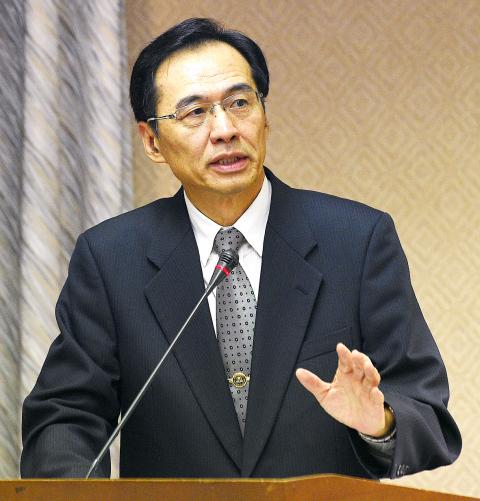The appointment of National Immigration Agency Director-General Mo Tien-hu (莫天虎), who has an intelligence background, to the position of Chinese Nationalist Party (KMT) secretary-general has set some tongues wagging.
The KMT’s Central Standing Committee approved the appointment on Wednesday. Mo, who has applied for retirement, is slated to take over the position with the KMT on Monday.
Mo has worked at the Ministry of Justice’s Investigation Bureau as director of the Taipei City Field Office Shihlin Station, Hualien County Station and Tainan City Station, the deputy director of the bureau’s Domestic Security Field Office, deputy director of the Kaohsiung City Field Office, director of the Tainan City Field Office and director of the Domestic Security Field Office.

Photo: Chen Chih-chu, Taipei Times
In a goodbye statement issued to his colleagues on Wednesday, Mo said the new role is expected to be “full of difficulties and challenges, which would amount to jumping into a fire pit.”
However, fawning over the powerful is not his thing, he said.
“Offering help when someone is in trouble is what I love doing. I always believe that achievements can only be made with a bit of foolish gung-ho, which I have,” Mo said.
A dedicated Christian, Mo said, “facing an unknowable future, I will give it all to God.”
The appointment surprised the media, KMT members and lawmakers, who said they are unfamiliar with Mo, who has never worked in the party system, and are therefore skeptical about his ability to coordinate the party and the caucus.
KMT committee member Yao Chiang-lin (姚江臨) said it is within the chairperson’s authority to make personnel appointments, but based on experience, it does not work well if the party secretary-general is someone who had no direct experience of working with the party.
KMT caucus whip Lin Te-fu (林德福), who doubles as the party’s deputy secretary-general, said although Mo had worked mostly with investigative units, he could facilitate communications with the party lawmakers by interacting with them more.
However, some joked that Mo’s intelligence background would probably make lawmakers and committee members nervous.
KMT spokeswoman Wang Hong-wei (王鴻薇) yesterday said party members are all in the same boat and should not criticize the party.
Media personality Clara Chou (周玉蔻) on Wednesday wrote on Facebook that the appointment reminded her of the Chiang Kai-shek (蔣介石) era, during which intelligence officials were also party heavyweights greatly depended upon by Chiang.
Democratic Progressive Party (DPP) Legislator Wang Ting-yu (王定宇) said that while society still fears intelligence is being used for political purposes, Hung’s appointment of an intelligence official to KMT secretary-general is reconnecting the intelligence system to the party.
“This is [democratic] regression,” he said.
DPP Legislator Pasuya Yao (姚文智) said Mo’s appointment was a surprise to him, but added that with Mo’s background, he could be expected to conduct a thorough examination of the KMT’s assets, which some suspect might have been embezzled by private individuals.
Former Deputy Legislative Speakers’ Office director Chiao Cheng-chung (喬正中), who has been one of Hung’s aides for almost 20 years, had also worked as an agent with the investigation bureau.
Chen Hang-sheng (陳杭升), who was appointed early last month by Hung to serve as the head of the KMT’s Administration and Management Committee, also has an intelligence background.
The appointment has spawned some discussion within the party as to whether Hung is to rely on Chen’s expertise to discipline the party.

Several Chinese Nationalist Party (KMT) officials including Chairman Eric Chu (朱立倫) are to be summoned for questioning and then transferred to prosecutors for holding an illegal assembly in Taipei last night, the Taipei Police said today. Chu and two others hosted an illegal assembly and are to be requested to explain their actions, the Taipei City Police Department's Zhongzheng (中正) First Precinct said, referring to a protest held after Huang Lu Chin-ju (黃呂錦茹), KMT Taipei's chapter director, and several other KMT staffers were questioned for alleged signature forgery in recall petitions against Democratic Progressive Party (DPP) legislators. Taipei prosecutors had filed

Taiwan would welcome the return of Honduras as a diplomatic ally if its next president decides to make such a move, Minister of Foreign Affairs Lin Chia-lung (林佳龍) said yesterday. “Of course, we would welcome Honduras if they want to restore diplomatic ties with Taiwan after their elections,” Lin said at a meeting of the legislature’s Foreign Affairs and National Defense Committee, when asked to comment on statements made by two of the three Honduran presidential candidates during the presidential campaign in the Central American country. Taiwan is paying close attention to the region as a whole in the wake of a

President William Lai (賴清德) has appointed former vice president Chen Chien-jen (陳建仁) to attend the late Pope Francis’ funeral at the Vatican City on Saturday on his behalf, the Ministry of Foreign Affairs said today. The Holy See announced Francis’ funeral would take place on Saturday at 10am in St Peter’s Square. The ministry expressed condolences over Francis’ passing and said that Chen would represent Taiwan at the funeral and offer condolences in person. Taiwan and the Vatican have a long-standing and close diplomatic relationship, the ministry said. Both sides agreed to have Chen represent Taiwan at the funeral, given his Catholic identity and

Lawmakers from the Democratic Progressive Party (DPP) yesterday established a friendship group with their counterparts in Ukraine to promote parliamentary exchanges between the two countries. A ceremony in Taipei for the Taiwan-Ukraine Parliamentary Friendship Association, initiated by DPP Legislator Chen Kuan-ting (陳冠廷), was attended by lawmakers and officials, including Deputy Minister of Foreign Affairs Francois Wu (吳志中) and European Economic and Trade Office in Taiwan Director Lutz Gullner. The increasingly dire situation in Ukraine is a global concern, and Taiwan cannot turn its back when the latter is in need of help, as the two countries share many common values and interests,